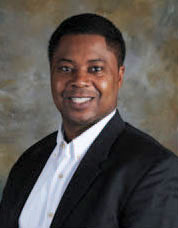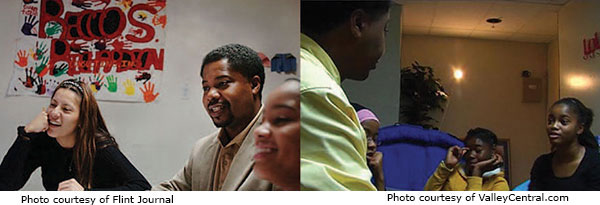Ferris State Alumni Association
420 Oak Street, Big Rapids
(231) 591-2345
 After graduating from Ferris' College of Business in 1987 with a Bachelor of Science
in Business, Recco Richardson went on to earn a Master of Arts in Counseling Education
from Central Michigan University and a doctorate in Professional Psychology from Walden
University. A board-certified professional counselor, he specializes in the treatment
of children, adolescents and adults for such issues as Attention Deficit Hyperactivity
Disorder, academic problems, anger and anxiety, bipolar disorder and depression. He
recently spoke with Ferris Magazine about how his experience at Ferris helped him
go on to make a positive impact on the lives of others.
After graduating from Ferris' College of Business in 1987 with a Bachelor of Science
in Business, Recco Richardson went on to earn a Master of Arts in Counseling Education
from Central Michigan University and a doctorate in Professional Psychology from Walden
University. A board-certified professional counselor, he specializes in the treatment
of children, adolescents and adults for such issues as Attention Deficit Hyperactivity
Disorder, academic problems, anger and anxiety, bipolar disorder and depression. He
recently spoke with Ferris Magazine about how his experience at Ferris helped him
go on to make a positive impact on the lives of others.
Ferris Magazine: What originally brought you to Ferris?
Recco Richardson: Leaving my hometown, Flint, for studies at Ferris State University wasn't necessarily a natural progression for me. According to my ACT score of 12, high school GPA of 2.5, my having been raised in a single parent home and other statistics, I had very little chance of succeeding at Ferris or any other college. Ferris was the only college that accepted me for enrollment. Little did I know then that a new world of cultural differences, commitment, academic excellence and a host of formal and informal mentors awaited my arrival.
FM: How did Ferris help you?
RR: As I look back, I would say a critical aspect of my experience at Ferris, and one that still influences me, was the opportunity to that I had to explore, be creative and provide leadership on campus. Prior to enrolling at Ferris, I wasn’t necessarily a follower or the most likely to succeed. My involvement on campus with various student organizations, such as Youth Ambassadors for Christ, Inner Varsity and the Public Relations Student Society of America, and several campus tasks forces and initiatives sparked my interests in serving others, developing programs and promoting what is now called "social change."
FM: How are you using that lesson and creating social change through your work now?
RR: Today, I experience great joy and satisfaction in my counseling private practice. Through my weekly individual or family counseling sessions, regular prevention and intervention programs, scholarly article writing, adjunct teaching duties at local colleges, community involvement and various training programs, I’m led to believe that I’m making a difference in the lives of others.
FM: You work in the Flint area, primarily with young persons from dysfunctional families. What types of issues do they face?
RR: After 25 years of service in the health and human services field, I’m finding that more and more young people – even those who are not from dysfunctional families — are facing identity problems, intense anger, lack of purpose or future goals, inadequate interpersonal skills, levels of depression, and the like.
FM: What are some of the challenges faced by these students?
RR: I think it is safe to say that, in six out of 10 communities, students are not at grade level, academically. I have served on the school board of two prominent school systems and regularly reviewed the local Intermediate School Districts’ reports on MEAP, ACT and annual yearly academic growth of students from every district (21, in all) in our county. There is not much difference between the outcomes of rural, urban and inner-city youth.
Specifically, today’s students tend to not be at grade level in reading and math. It is common for an eighth-grade student to read at the fifth-grade level. Failure to be at grade level can cause students to under-perform academically, display more inappropriate behaviors that lead to school suspensions, disrupt other students’ learning or even put their parents’ jobs at risk, if their parents must frequently leave work to attend to school matters.
FM: What is a day in the lives of these students like?
RR: A typical day in the life of such students is one that is becoming the trend in America. They reside in single parent homes, have a difficult time accepting their parent’s significant other, want a better life, realize that their family lacks resources, and the like. From this point, they either start to act out in school and make unhealthy relationships — or they set themselves up to be different and make a good life for themselves. Sadly, upwards of 55 percent tend to not select the latter option.
FM: How do you try to help them?
RR: My approach is that of concern. The first question I ask is “What do you want out of life, and how can I help you?” My foundational principles are rooted in Christian compassion, and time-tested and traditional counseling theories of human development and psychopathology. Whatever each young person needs me to become, I try to become it.
I tend to have good success with all students, especially at-risk students and those from dysfunctional homes. What I have found is that such students want to change and improve. They are willing to trust and follow the rules and system so long as they feel someone cares. It doesn't matter to them if I’m their mental health counselor, mentor, minister or sports supporter. They really just need someone to care and hang in there with them.
FM: How can educators, parents, law enforcement and community members support students with these issues?
RR: The best way for educators, parents and others to help our youth is to become involved in their lives. Offer them opportunities for personal growth and help them develop a love for life — a consistent and wholesome life.
FM: What do you think students gain from an experience at Ferris?
RR: I continue to be totally sold on Ferris as the university of choice for high school students and non-traditional students who desire an exceptional education and opportunities that add value to the learning environment.
Over the years, I have learned a lot about young people. Like I did, some 30 years ago on campus, they want to make lives for themselves. They desire an opportunity to develop, and maximize their skill sets and personal interests. They want to do and become. It is within them to try and excel. They have a need to explore, create and take on challenges. Ferris is a place where they can grow, embrace others, develop character, meet lifelong friends, learn and set the stage to live fulfilled for the next 50 years or more.
